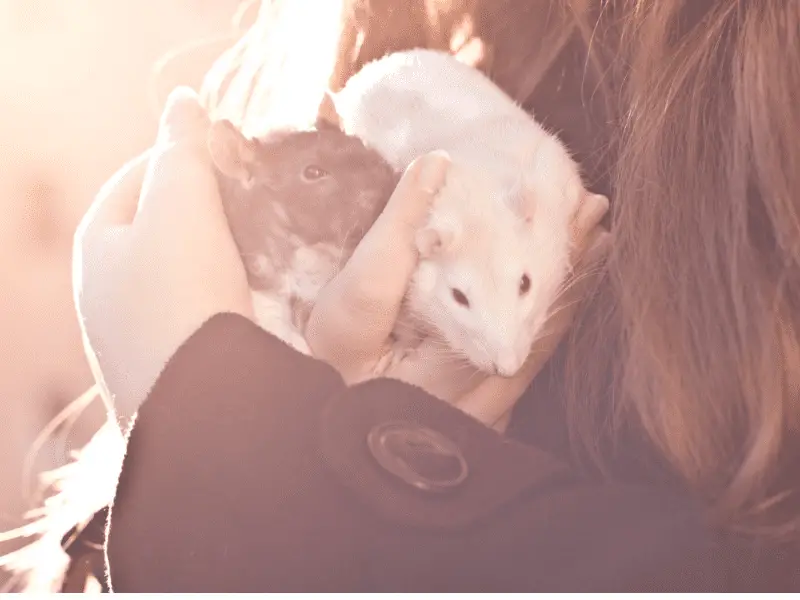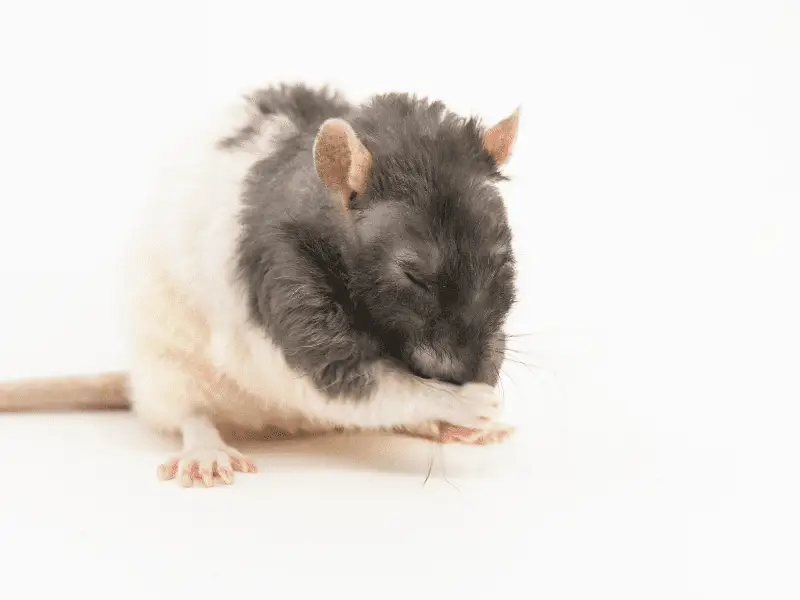This article contains affiliate links, and we may earn a commission at no cost to you if you choose to purchase through these links. I never recommend products that I do not trust or will not advise my veterinary clients and patients to use.
A pet rat is considered to be a senior from the age of 18-20 months. They, in essence, spend almost half their lives as seniors. There are many things that rat owners can do to ensure that senior rats have healthy and comfortable golden months.
Geriatric rats are often not as agile as they used to be and may have more difficulty navigating multiple cage levels. A senior rat’s environment should make it easy to access resources and offer appropriate environmental enrichment. In addition, certain conditions such as kidney disease or tumors are much more prevalent in older rats, and owners should address these conditions as soon as symptoms arise.
Looking after a geriatric rat entails many special considerations. So let’s look at a few tips to help keep them happy and healthy for as long as we possibly can.

Do Regular Physical Checks
At-Home Physical Checks
If you familiarise yourself with what is normal for your pet rat, you will be able to pick up small changes indicating a decline in health much sooner.
Have a look at this step-by-step guide on how to do a physical examination and health check on your pet rat at home. I encourage all rat owners to do this at least every 2 weeks. It is something that Physical checks can conveniently incorporate into playtime without them even knowing they are being examined.
Since most rats will object to some of the less comfortable steps of the physical exam, it is best to disguise those steps in playtime and offer tasty treats for cooperation. If you take special care to make it a positive experience and do it often enough, your rat will most definitely get used to being examined.
Vet Checks
Rat owners that spend time looking at their rats closely are a vet’s favorite type of owner! That way, you help your vet pick up on problems earlier and provide better care. Don’t ever hesitate to raise concerns and ask questions to your vet. Having a good relationship with your vet is your biggest ally in keeping your rat healthy.
As important and helpful as a home physical exam is, it will never replace a regular vet check. Having a knowledgeable and experienced vet examine your rat regularly provides a fresh set of eyes that will be able to pick up on things you might not have noticed.
You should take your rat for an annual check in year one and then every 6 months once it reaches 2 years of age.
Dental Check
Pay special attention to the teeth as the incisors keep growing throughout their lives and need to be worn down by gnawing. Senior rats tend to spend less time gnawing and are prone to overgrown incisors, which, if severe, can cause serious malocclusions and lead to difficulty and pain when eating. This will lead to weight loss in the long run. Consult with your vet if you think that your rat might have overgrown incisors or pain while eating.
Nail Check
As senior rats move around less, their nails will tend to become overgrown. Severely overgrown nails cause pain when walking and will cause them to slip on hard, smooth surfaces and may snag on soft bedding. You can use small pet nail clippers to clip off the transparent end of your rat’s nails. In the case of black nails, try and gauge how much to clip compared to the other paws. If you accidentally clip too short and the nails start bleeding, having styptic powder will also be very helpful to stop potential bleeding. If you are uncertain about doing this, ask your vet to show you how to do it at your next check-up.
Set Up The Cage To Make It Easier For Them To Get Around
Strength And Mobility Considerations
Senior rats often move around with increasing difficulty as they age. As their joints age and becomes increasingly arthritic, moving around will become more uncomfortable and, eventually, painful. The muscle mass of senior rats also declines as they age, causing them to lose strength.
Rats are also prone to myelodegenerative disorders (loss of nerve function- often in the hindquarters) as they age. This commonly presents as weakness in the hind legs and will often progress to complete hindlimb paralysis.
Young and healthy pet rats will walk, placing most of their weight on the front part of their feet and carrying their tail off the ground as if walking tip-toed. However, you may start noticing that your older rat will walk, placing more weight on the back part of their feet and almost dragging their tails along. This is one of the first signs of declining mobility and strength.
The goal regarding the cage setup is to make it as easy and comfortable for them to move around as possible while encouraging movement at the same time.
Maintaining muscle strength and joint mobility is extremely important to keep senior rats moving around with ease for as long as possible. Encourage gentle exercise by hiding treats or allowing them to roam in a rat-safe designated area (you can read more about how to let rats spend time outside of their cage in this article).
Smooth or slippery surfaces can lead to uncoordinated or weak senior rats injuring themselves. These injuries could easily prevent by providing them with appropriate surfaces. However, as is the case in most conventional rat enclosures, a plastic surface with shavings is not conducive to the musculoskeletal health of an elderly rat with painful or weak joints and muscles.
VetBed is an excellent option to use as a surface covering for frail or weak pet rats. It is conveniently machine washable and provides your rat with a surface that they can easily grip onto while being soft at the same time. You can check the recent pricing for Vetbed on Amazon here.

Food And Water Acessability
Remember to consider the accessibility of food and water as well. Water should always be within reach and readily accessible. Older rats are commonly more prone to dehydration and even more so if kidney function declines.
Food bowls should be shallow and have a narrow lip. In some cases, you may have to serve food on a small towel, depending on how mobile your rat is.
Considerations For Declining Vision
Some older rats will start to have a decline in vision. To best help them navigate the cage, the cage arrangements should be kept consistent, and re-arranging the cage should be avoided. A cagemate will also help a rat with declining vision get around by acting as a guide.
I have often found that rats who have bonded go out of their way to assist and look out for cagemates with declining health. If you would like to read more about what the science says about rat emotions, you can have a look at this article that sums up what the most recent research on rat intelligence found.
Monitor Their Weight
I always encourage all rat owners to weigh their rats every week. A regular kitchen scale gets the job done. This helps to note trends in weight changes. Being overweight and underweight can be equally as concerning. Remember that small fluctuation in weight from week to week is normal, but if your notice an upward or downward trend, diet adjustments to keep the
If you notice that your senior rat is losing weight unintentionally and without adjusting the amount or type of food offered, you should take your rat to see the vet as unintentional weight loss can indicate many serious diseases and should be addressed as soon as possible.
On the contrary, a rat that is overweight or obese has a higher risk for early mortality. Being overweight predisposes your rat to nearly all common rat health concerns. Preventing your rat from becoming overweight is the single best thing you can do to help your rat live a longer, healthier life – this is something I feel very strongly about
Preventing your rat from becoming overweight is the single best thing you can do give them a chance to a longer, healthier life.
Adjust Their Feeding
I have written an in-depth article on all the details and considerations of feeding a senior rat. You can view the full article here.
In summary, senior rats will benefit from a diet high in antioxidants such as vitamin A and E and Alpha Lipoic Acid. Antioxidants help fight free radicals, which lead to premature cell aging and have potential anti-cancer properties.
In addition to this, it is best to feed your rat, assuming that they have declining kidney function. This calls for a moderate protein, low salt, low phosphorus diet. Omega 3 fatty acids have also been shown to have potent anti-inflammatory properties that are beneficial for just about every chronic condition.
Feeding should also be adjusted according to fluctuations in weight. If you notice that they are losing weight, adjust their feeding by adding higher calories foods such as peanut butter or other treats they may like.
Temperature Control
Older rats will have difficulty regulating their body temperature and may need some extra help from their owners. The ideal and most comfortable room temperature to keep rats in is around 70-75°F (22-24°C).
Rats of all ages do not cope well with heat. They can not pant and only have a small number of sweat glands on the bottom of their feet. Rats cool themselves down by dilating the vessels in their ears and tail in order to dissipate core body heat. Unfortunately, this mechanism has limited effectiveness, and rats are prone to heatstroke.
For this reason, rats should ideally be kept in a cool or airconditioned room if you live in an area where the summer temperatures readily go above 75 degrees. You can offer iced treats such as frozen blueberries and place wet face towels in their environment to help cool them down. Some rats will even grow a liking for swimming or spending time in shallow water if they have access to a large enough water area.
Older rats have more trouble warming themselves up. If you have a senior rat that does not live with cagemates, providing them with a heated bean bag or a focused UV light during the colder months will help a lot. That way, they can move away from the heat source if they feel the need to.
Environemntal Enrichment
Toys
Providing your rat with some daily fun will help stave off cognitive decline as he/she ages. Providing toys such as puzzle food toys or toilet paper rolls to shred will encourage activity. Keeping them moving around will help to maintain strength and mobility.
Music
Another powerful, although lesser know tool in the environmental enrichment department is music. The effect of music on intelligence has been a subject that fascinates researchers for hundreds of years, and rats have often been the subject of these studies.
If you would like to read more on how music can be used as environmental enrichment for your senior rat, have a read in this article I wrote, explaining all the nuances of the effects that music has on rats.
Time Outside Of The Cage
Allowing playtime outside the cage is another great way to encourage movement and mental stimulation in senior pet rats. For tips and suggestions, have a look at this article.

Seperate Your Senior Rat From Bully-Rats
Frail rats, and especially rats that move with difficulty or have some degree of paralysis, will be susceptible to bullying by younger rats. Therefore, if you find that your youngster out-compete your senior(s) for food and bed space, it will be in the best interest of your senior to move them to a separate enclosure.
Younger rats will rarely injure or kill a senior rat. This is often only seen in extreme circumstances, such as when food and water resources are very limited or if there are other major health or behavioral problems at play. You can read more about aggressive behavior and the likelihood of a rat killing a cagemate in this article.
This does not mean that all seniors have to be kept separate from all youngsters, as it is not uncommon for younger rats to ‘look after’ senior or frail rats by helping them groom. If your senior rat has some degree of vision loss, a younger friend can be a great ally for your senior to help them to navigate.
Clean Them Up If They Are Unable to
Urine Scalding
Some elderly rats will start to find it hard to clean themselves as their mobility declines. Frail rats will commonly start to leak urine which can cause skin irritation around the bum, thighs, and belly. If you have found that your rat does this, check them daily and bathe if needed. Baby wipes work well for mild messes. Baby bum cream such as Butt Paste also works well to help soothe skin irritation caused by urine scalding.
VetBed is also very helpful in rats that are incontinent/unable to move away from urine in that it helps to which away urine from the body, preventing scalding.
Check The Ears
As older rats become unable to reach their ears, exudate may build up in the ears, making it a nice breeding ground for bacteria. If you find that your senior rat has mucky ears, you can gently clean it once weekly using a moist cotton ball.
Boy Problems
You may notice that your male rat has a hard white granular piece of material near the tip of the penis. This is called an ejaculatory plug, and it is made up of dried skin and sperm cells. It usually does not cause problems in younger rats, but if it becomes large in older rats can cause discomfort. You can remove this by gently squeezing the tip of the penile sheath.

The oldest documented rat was named Rodney and lived with his namesake owner, Rodney in Tulsa till he passed at the impressive age of 7 years and 4 months in May 1990.
Quality Of Life – When Is It Time?
Since our rats can not tell us when they are unhappy, frustrated, or painful, it is up to us to hear the silent whispers of what they want us to know. And no, I am not going the airy-fairy animal whisperer route here. A rat must be able to do rat things, pain-free – simple as that!
We can judge whether a rat has a good quality of life by looking at the amount of time they spend doing things that rats enjoy doing. So if your senior rat still boggles when you offer them their favorite treat or still enjoys spending time outside of the cage or following you around, they are doing great.
But if you find that your elderly rat spends the whole day sleeping, constantly has urine scalding or other painful conditions, and does not eat unless you place the food right in front of his/her nose, I would encourage you to talk to your vet.
I am a huge advocate for preventing or ending suffering. If you think that your rat may be near their end (and owners often have a good sense of when this is – trust yourself!), having them humanely euthanized by your vet may be the kindest thing you can do for your rat in such a situation—Euthanasia, when done correctly and by a veterinarian, is painless.
At the very least, let your vet have a look and help you make the decision. Sometimes our judgment becomes clouded with emotion when our own pets are having a difficult time. Having a trusted vet by your side in situations like these will help you to make a decision in the best interest of your beloved rat.

